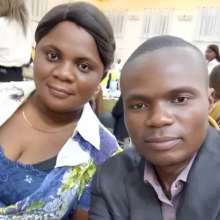🌍 When Understanding Begins: Developing Empathy and Embracing Our D
🌍 When Understanding Begins: Developing Empathy and Embracing Our Differences
Empathy is more than an emotion—it is a discipline, a way of seeing the world, a decision to feel with others rather than simply observe them. Yet the ability to truly understand another person’s struggles often requires breaking through invisible walls: the walls of upbringing, bias, social conditioning, and the silent prejudices passed down through generations.
Few stories illuminate this better than Our Hearts Against the Universe: Love Stronger Than Color, Poverty, and the Chains of Injustice, the powerful novel by Victor Djimbila Kazadi. This work invites us to confront what we often do not see, question what we think we know, and expand our emotional capacity to connect with others.
________________________________________
💡 The Invisible Obstacles: Poverty, Skin Color, and Family Judgment
We often speak of empathy as “putting ourselves in someone else’s shoes,” but what if we have never walked the terrain they cross every day?
This novel confronts us with precisely that challenge.
1. Poverty as a Social Barrier
ARCHANGE KASELA, a poor white man, faces contempt and humiliation from his wealthy in-laws. His lack of financial status becomes a weapon used against him—exposing how society equates worth with wealth and overlooks the dignity of those who have little.
2. Skin Color as a Source of Prejudice
ANGE DJIMBILA, despite being from a wealthy and influential family, is rejected by Archange’s relatives simply because of her skin color. The novel forces us to examine how racial prejudice infiltrates even the most intimate spaces—families, relationships, and identities.
3. Family Prejudices That Shape—and Distort—Love
Both characters face emotional wounds inflicted not by strangers, but by the people closest to them. These familial biases reveal how discrimination is often inherited, disguised as tradition, and rarely questioned.
Together, these obstacles create a tapestry of injustice that many people live with daily—often unseen, unspoken, and misunderstood.
________________________________________
🌱 A Story That Cultivates Empathy
What makes this novel exceptional is not just the love between Archange and Ange, but the way their struggles teach us to see beyond the surface.
• We learn that poverty is not a moral failure, but a circumstance shaped by history, opportunity, and inequality.
• We witness how skin color continues to define the way society assigns value, even in modern relationships.
• We recognize how family-induced prejudice can wound even the strongest hearts, and how those wounds shape our understanding of self-worth.
By immersing us in the raw emotional truths of its characters, the novel gently guides us toward greater compassion and understanding.
________________________________________
🔍 Understanding Often-Invisible Social Realities
Most people live with unseen burdens—pressures we do not notice because they are not ours to carry.
This story helps us uncover those hidden realities:
• The shame that poverty forces people to swallow
• The silent battles fought by those judged for their skin
• The emotional scars left by families who reject instead of embrace
• The pain of loving someone society says you should not love
These are not fictional problems—they are real, lived experiences for millions around the world.
The novel becomes a lens that sharpens our awareness and deepens our humanity.
________________________________________
📘 Lessons Learned From This Teaching
This powerful narrative leaves us with essential life lessons:
1. Empathy begins where judgment ends.
To understand others, we must first set aside the biases we inherited unconsciously.
2. Differences enrich us, not divide us.
Color, culture, and class should be sources of learning—not barriers to love.
3. Love is strongest when tested.
Archange and Ange show that true connection grows deeper when it resists injustice.
4. Prejudice is a learned behavior—and understanding is the antidote.
We have the responsibility to unlearn harmful narratives and replace them with compassion.
5. Seeing the unseen is the first step toward healing society.
Recognizing invisible struggles allows us to build a world rooted in respect and dignity.
________________________________________
🚀 Take the First Step Toward Deeper Empathy—Read This Story
If you are ready to broaden your heart, challenge your perspective, and truly understand experiences different from your own, then you must read:
Our Hearts Against the Universe: Love Stronger Than Color, Poverty, and the Chains of Injustice
By Victor Djimbila Kazadi
👉 Click the link below to reserve your copy today and let this story transform the way you see others—and yourself.
🔗 Reserve your copy now: https://www.morebooks.de/sh...
ShopUi

